Today, recruiting tools are an essential part of hiring as technology advances and employers demand new and improved methods. According to a report by Eightfold, 92% of staffing firms plan to increase their use of automation in people management and talent acquisition. An IBM survey points that 42% of enterprise-scale organizations are using AI, including for recruiting purposes.
By using new technological solutions in recruiting, employers can reduce the monotony of the hiring and ensure the right talent is found. This article describes the best recruitment tools for modern employee acquisition.
What Recruiting Tools Are and Why They Matter
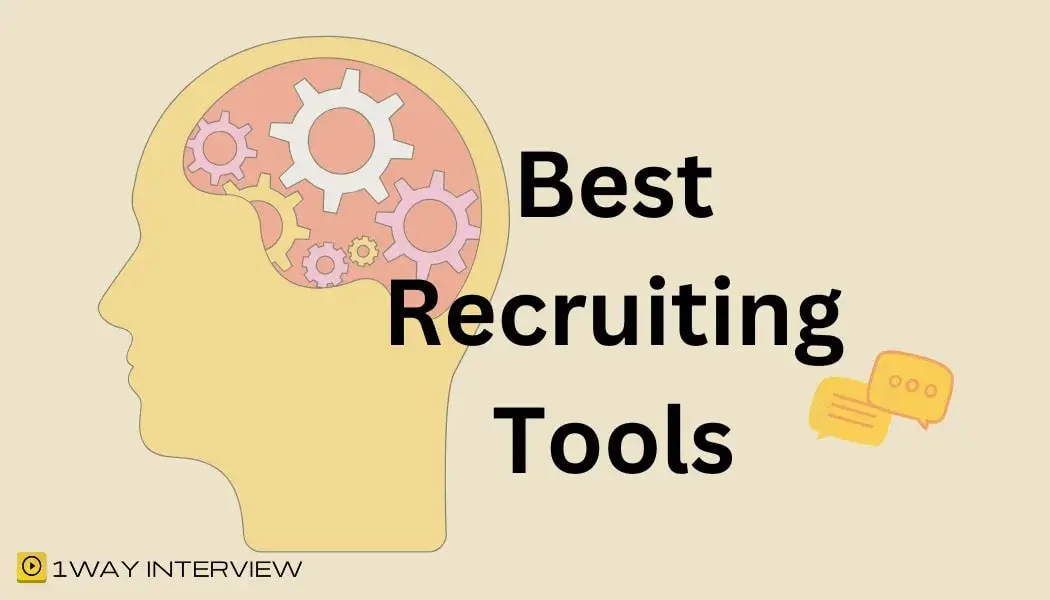
Recruitment tools is the software that help to facilitate and automate certain aspects of the staff acquisition process. Employers benefit from such tools because they can tackle difficulties such as sorting through huge applicant databases, reducing clerical mistakes, and avoiding preconceptions. Using these tools, businesses and organizations can effectively analyze candidates, enhance their experience, and acquire the right person in the right and faster way.
The key advantages of recruiting tools for employers include:
- Improve resume screening and setting up an appointment.
- Enable quantitative decision-making for recruitment processes to remove bias.
- Save costs by saving the team’s time on recurrent filtering and recruiting procedures.
- Increase the talent pool by allowing applications and, most importantly, accurately screen, track, and pay the global workforce.
There are various tools for recruitment on the market that make it possible for companies to scale their operations considerably and maintain quality at the same time.
Categories of Recruitment Tools
Recruiting tools can be divided into several categories, each dealing with certain needs in the selection process:
- Video Interview Software: Helps manage pre-recorded or live interviews for employers as well as reduce their time for candidates. Indeed, such tools find their applicability, especially where the candidate selection is done remotely.
- Applicant Tracking Systems (ATS): Centralizes and manages applications, tracks progress, and keeps hiring pipelines organized. ATS tools are most useful in scenarios where an organization has a number of vacancies to fill.
- Pre-Employment Assessment Tools: Assesses personnel performance, temperaments, and compatibility matching organizational culture in order to give objective insights during the decision-making process.
- Candidate Sourcing Platforms: Makes the task of sourcing candidates through jobs’ portals, artificial intelligent recommendations, and online directories easier and less time-consuming.
- Recruiting CRM Software: Manages interaction of candidates, prioritizing the development of a long-standing talent pool and engagement.
- Job Description Software: Streamlines the creation of clear, engaging, and bias-free job descriptions to attract top talent while ensuring consistency and compliance.
- Job Posting Tool: Distributes job listings across multiple platforms, increasing visibility and helping recruiters reach the right candidates faster.
- Skill Assessment Platform: Evaluates candidates’ technical abilities and competencies through customized tests, ensuring data-driven hiring decisions.
- Talent Assessment Platform: Measures cognitive, behavioral, and personality traits to match candidates with roles that align with company culture and job requirements.
- Onboarding Software: Automates and personalizes the onboarding routine and reduces administrative workload.
How to Choose the Right Tool: Main Points
The following considerations will help you choose the best tools for recruiting:
- Ease of Use: Make sure the tool does not need some special training and preparation for the recruiters and is easy to learn.
- Integration Capabilities: Seek out systems compatible with other systems in use by the human resources and recruitment departments.
- Cost-Effectiveness: It is important to select a tool that fits your budget for investment but at the same time brings visibility into its RoI.
- Scalability: Make sure that the software can meet your organization’s hiring needs now and as your human resources expand in the future.
- Support and Updates: Customer care and constant updates are the keys to the long run as a business.
Employers have to analyze their specific requirements in the hiring process and then select the digital recruiting tools that will be the most appropriate for the company.
Top Recruiting Tools
1. 1Way Interview – Best for One-Way Interviewing
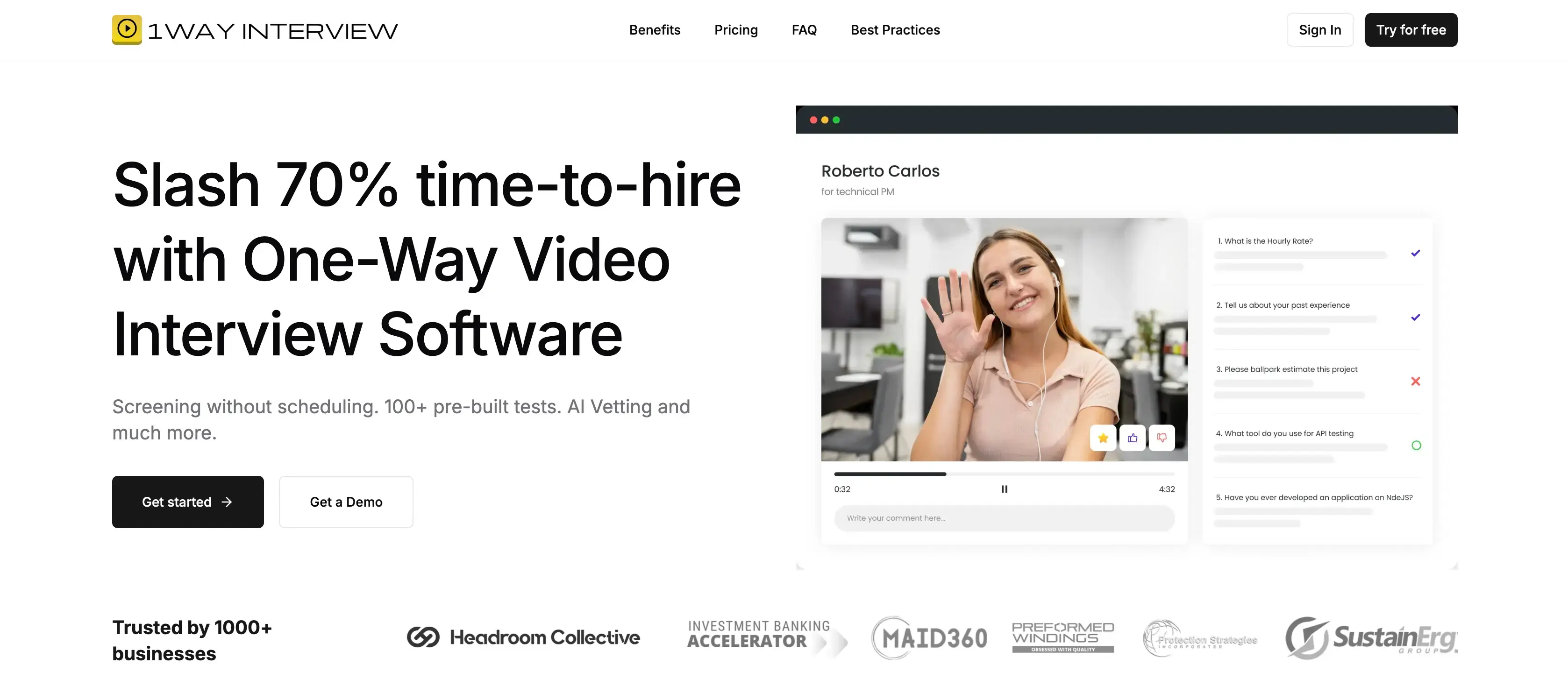
1Way Interview is an AI-powered platform designed to optimize the hiring by one-way interviews. Employers create interview sets of questions and allow candidates to record video responses when it suits them. This saves time in scheduling and enables for fair and performance-based assessment of candidates through their responses.
Pricing: Starts at $19.99
Key Features:
- Simplicity: A super user-friendly interface for both the employer and the job seeker.
- Self-Service: Open screening tests can be managed and tailored by employers on their own.
- AI Screening Tool: It helps in the evaluation of the responses.
- Integrations: Include a dozen integrations for ease of use.
- Pre-built tests: Hundreds of tests for different screening tests.
Pros:
- Library of 300+ tests for various screening tests.
- Questions in various formats: text, list, video, links etc.
- Built-in Applicant Tracking System.
- KEY FEATURE: AI Agent to pre-score candidate screenign tests.
Con:
- No live interview.
- No built-in scheduling (require integration with a free tool cal.com)
2. Recruitee – Best for Tracking Applicants
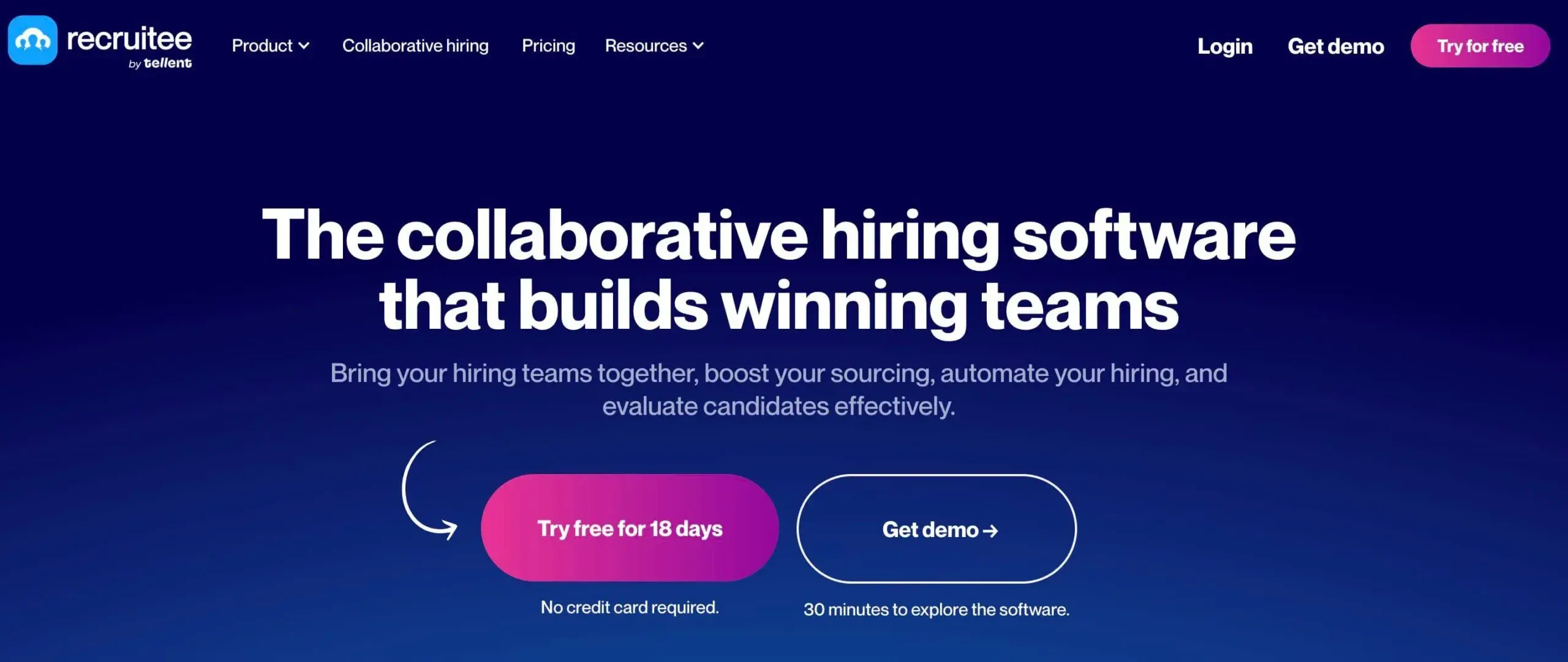
Recruitee is an Applicant Tracking System (ATS). Some of the key areas include pipeline management where users can simply drag and drop them; extending jobs with boards; as well as making over workflows.
Pricing: Starts at $91 per month for small teams.
Key Features:
- Efficient syndication of jobs to various boards.
- Businesses need team member engagement through collaborative hiring technology.
- Decision-making tools with summary trustworthy information.
Pros:
- Easy to use.
- Strong reporting capabilities.
- Good integration options.
Con:
- Limited advanced analytics.
3. TestGorilla – Best for Caniddate Assesment
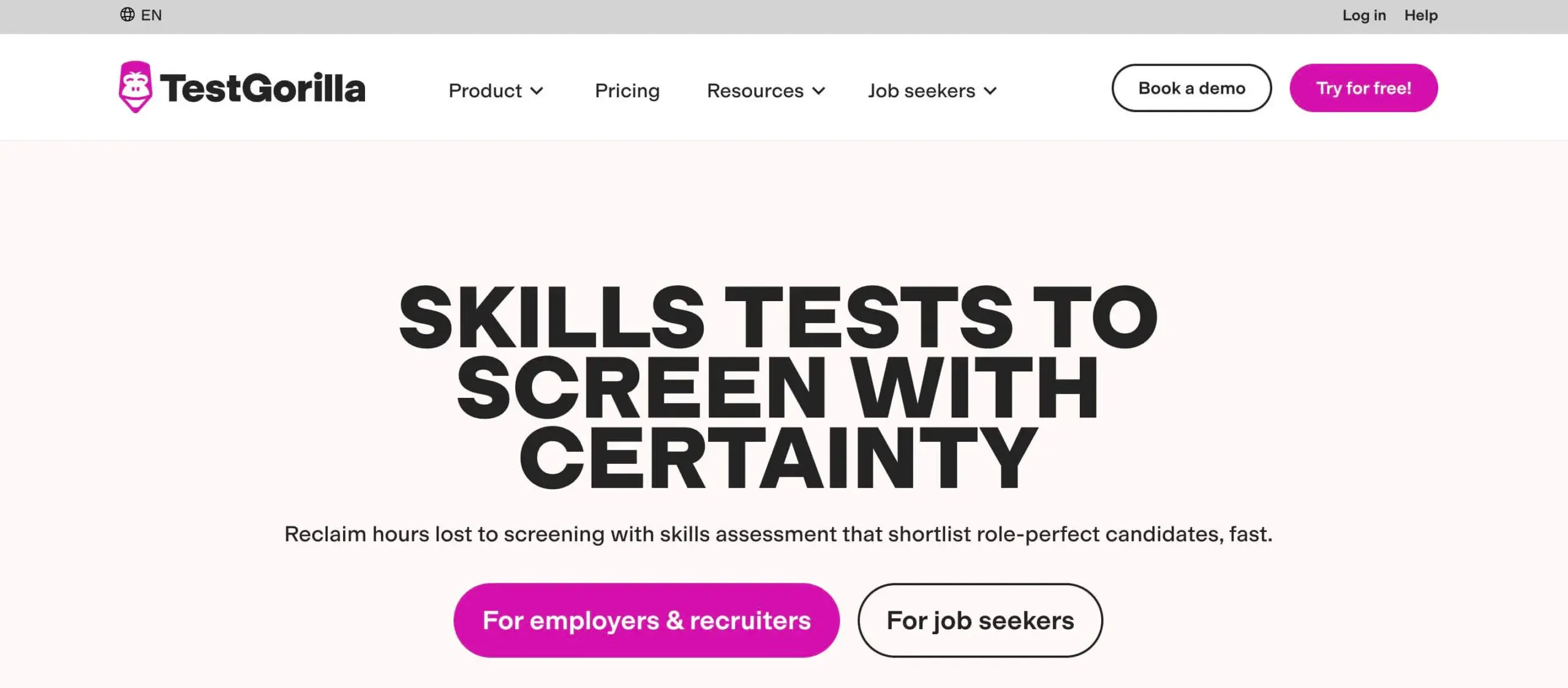
Candidate assessment tool. It provides a series of assessment tests, including technical, personality, and problem-solving.
Pricing: Starts at $26 per month per user.
Key Features:
- Provides over 200 tests for various screening tests.
- Job-specific tests developed in accordance with the demands of the occupations.
- Measures against malpractice in credible automated exams.
Pros:
- Comprehensive test library.
- Customizable assessments.
- Reduces hiring bias.
Con:
- Some tests may need a more convenient and strenuous form of customization, which is done by hand, especially in developing certain specific screening tests on the market.
- No video interviews
- Limited automatic test scoring
4. Holly – Best for Sourcing
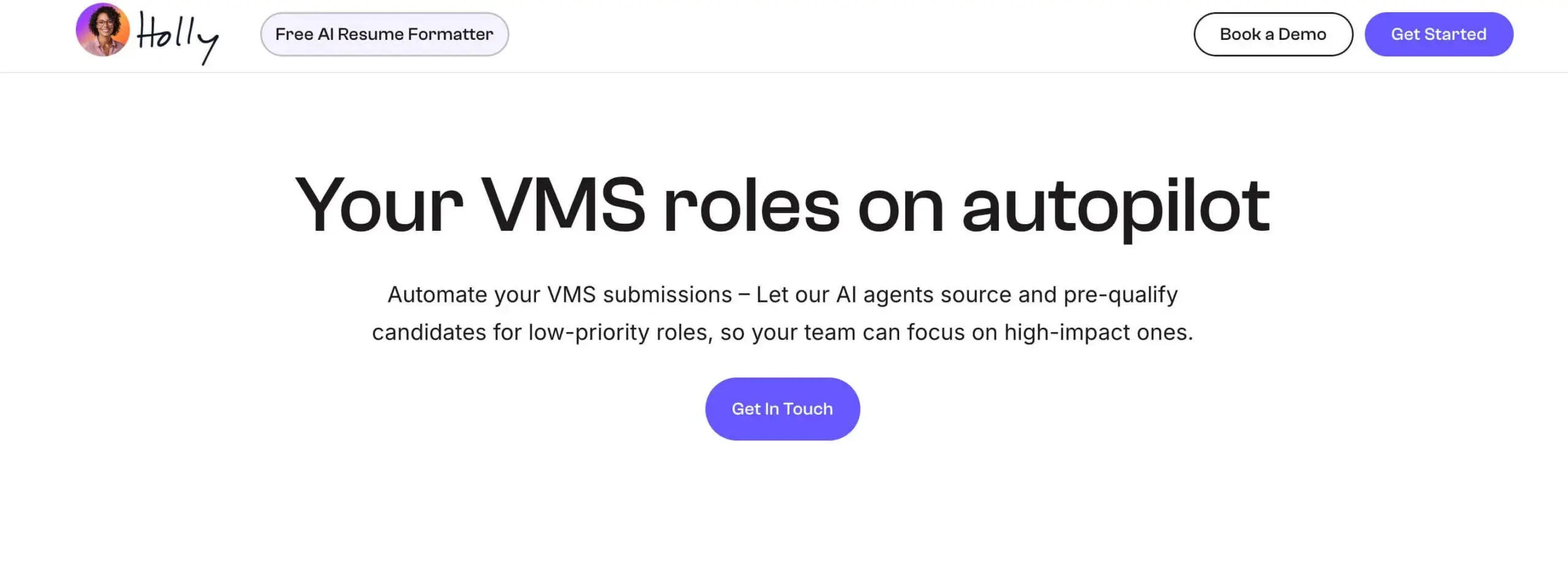
Holly is an end-to-end candidate sourcing tool that also amplifies the company’s ability to attract talents. It offers automatic candidate search in several databases simultaneously, ranking of the candidates, and the means to contact them.
Pricing: Starts at $59 per month.
Key Features:
- AI-powered talent matching.
- Differences in CRM features for the candidates.
- Compatible with the most popular ATS systems.
Pros:
- Fast candidate selection and searching.
- Screening that entails picking out high-quality candidates.
- Integration with ATS.
Con:
- Limited direct engagement characteristics.
5. LinkedIn Recruiter – Best for Candidate Journey
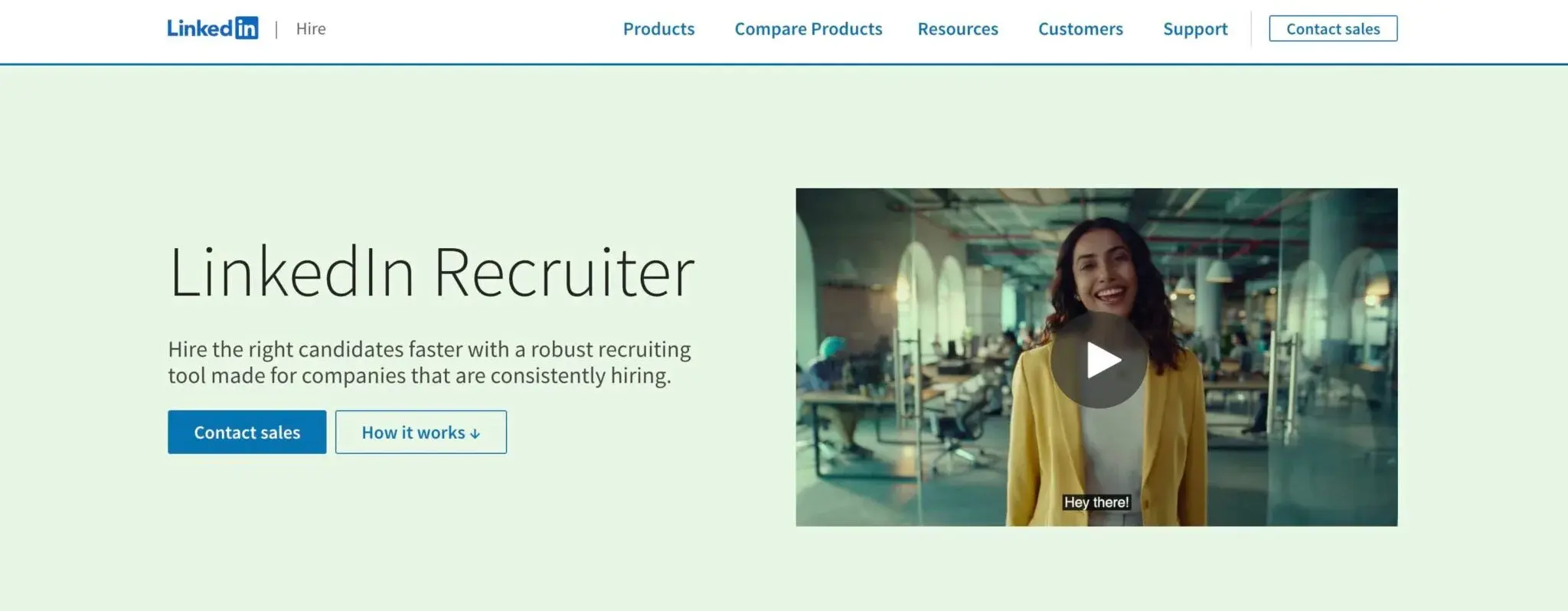
LinkedIn Recruiter ensures that all the processes of the candidate journey; sourcing, identification, engagement—are well provided. It includes search functionality where you can filter candidates, candidate details, and messaging.
Pricing: Starts at $139.99 per month.
Key Features:
- Use of its broad base of professional contacts through the LinkedIn site.
- InMail when addressing the candidates directly.
- Access to the information about candidates and their activities.
Pros:
- Wide database.
- Strong employer branding.
- Worldwide access.
Con:
- Costly compared to other products.
6. Ongig – Best for Job Description
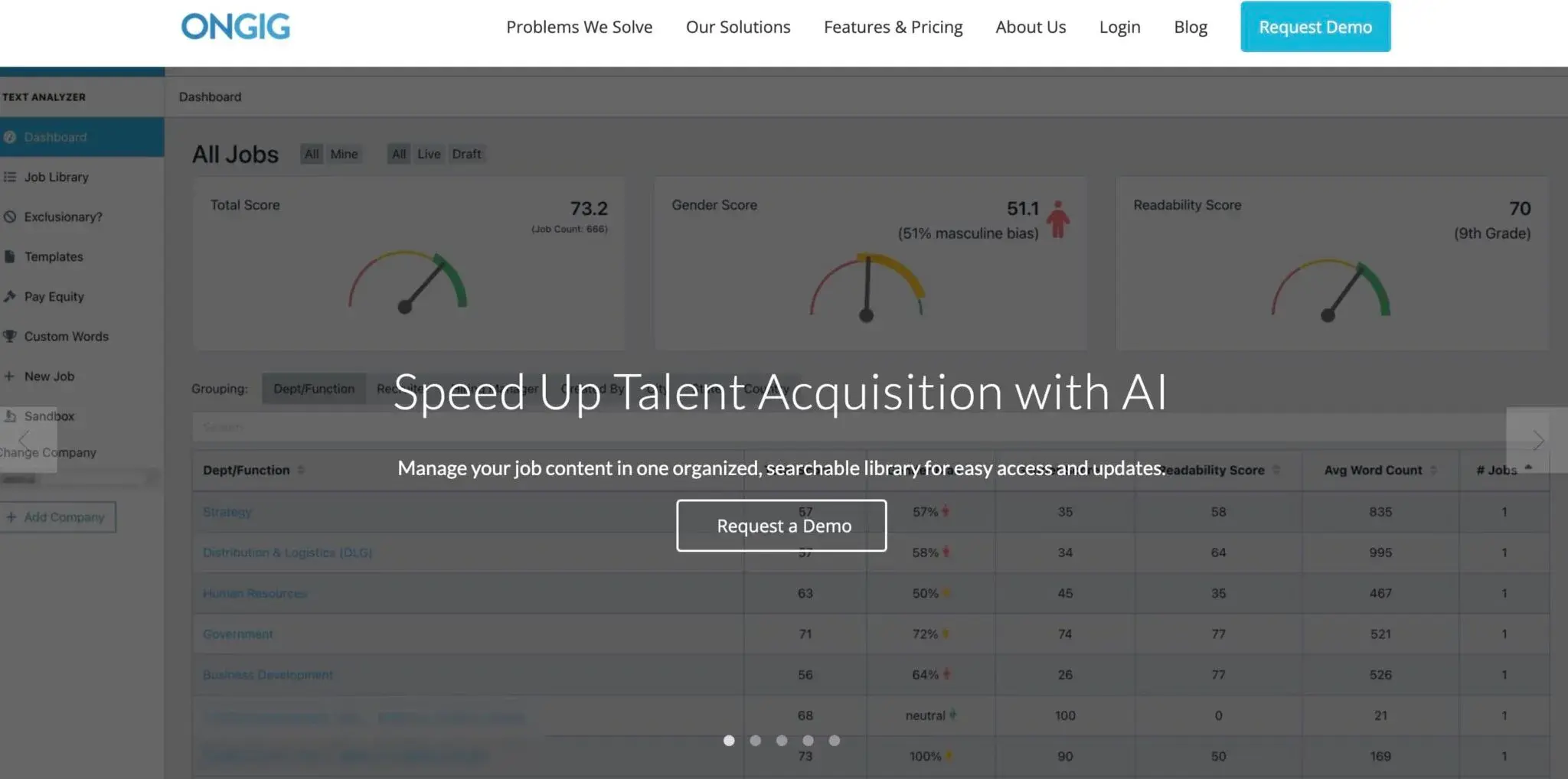
The Ongig platform improves job descriptions to maintain high clarity standards combined with search engine optimization. Product enables businesses to develop unbiased job descriptions for reaching their talent pool.
Pricing: Starts at $13,9K per year.
Key Features:
- AI systems perform language analysis to spot and eliminate bias from content.
- Customizable templates and branding enhancements.
- A proper SEO formatting approach enhances search engine searchability.
- Collaborative tools for seamless team input.
Pros:
- Strengthens diversity-focused hiring strategies.
- Enhances job post readability and discoverability.
Con:
- Too expensive for SMBs.
7. Workable – Best for Job Posting
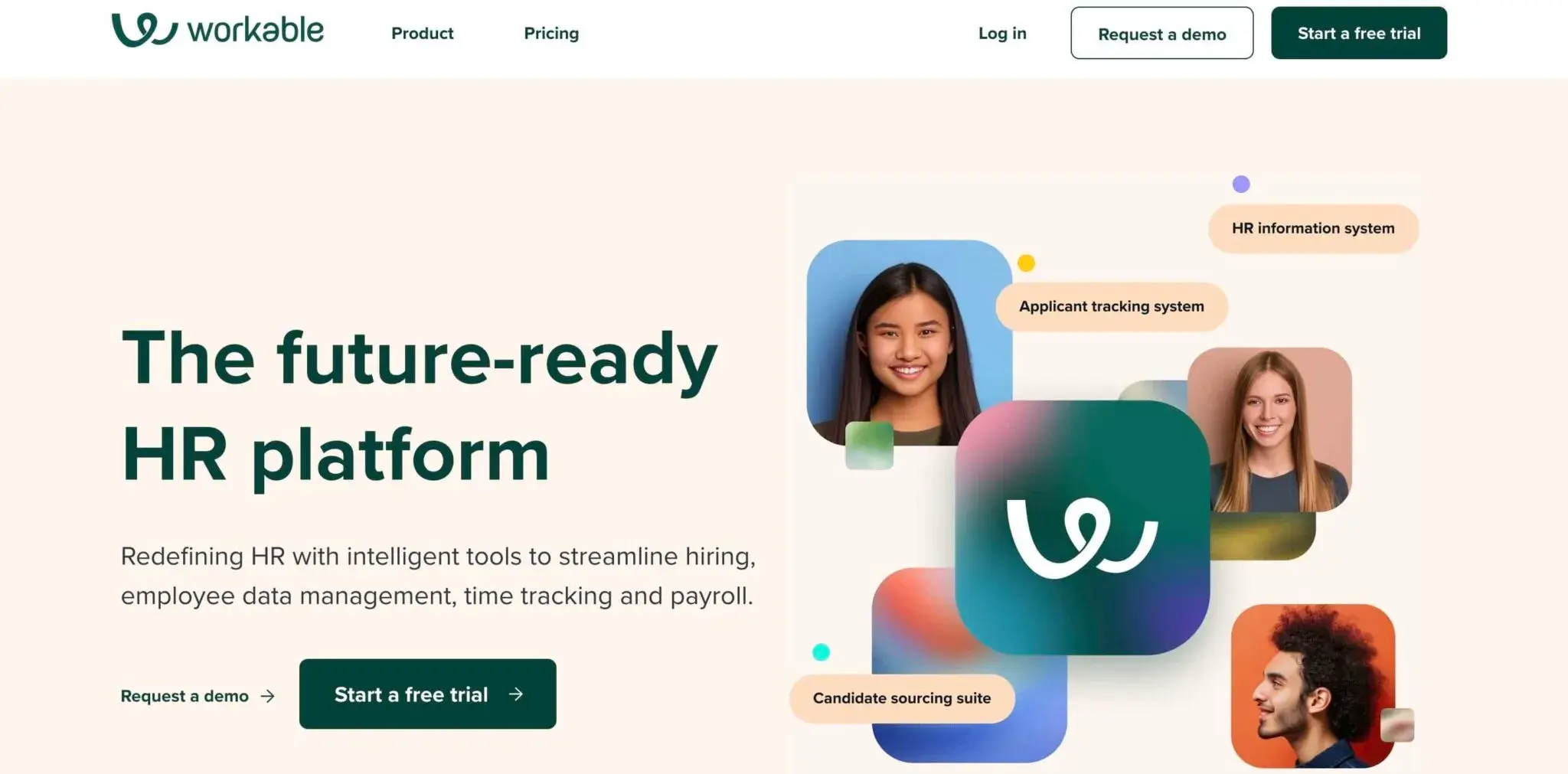
Workable is a hiring solution for job postings combined with candidate management. Multiple job boards receive job listings through Workable which also allows users to follow applicants and streamline management processes.
Pricing: Starts at $169 per month.
Key Features:
- Users can instantly publish jobs through on more than 200 available online job boards.
- AI-driven candidate sourcing and ranking.
- Customizable hiring workflows with team collaboration tools.
Pros:
- Extensive job board reach for maximum visibility
- Intuitive interface with smart automation
Con:
- Limited flexibility in starter subscription plan.
8. eSkill – Best for Skill Assessment
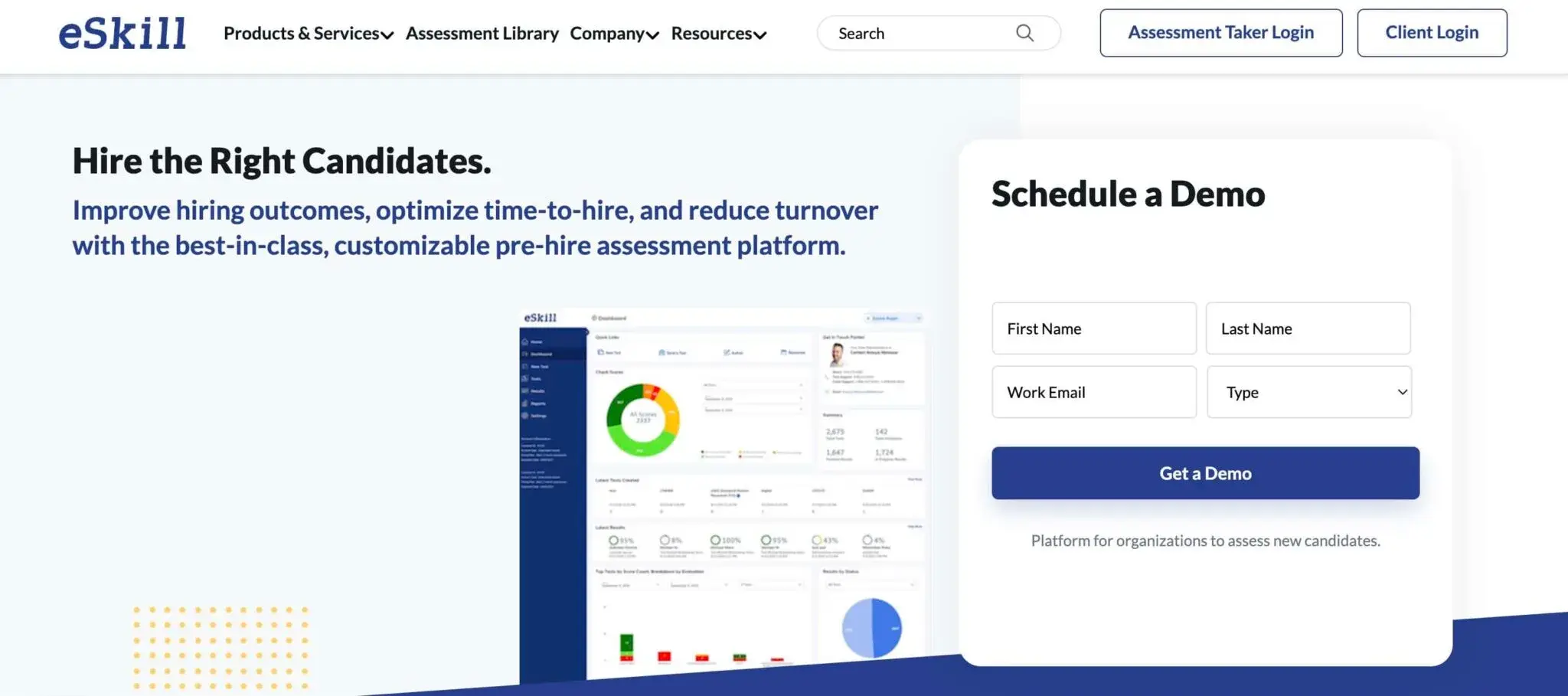
The skill testing platform eSkill provides role-based assessment through its system. Employers can evaluate multiple skills including both technical competence and cognitive abilities which leads to data-based choices.
Pricing: Starts at $250 per month.
Key Features:
- Huge selection of assessments both ready-made and customized to individual requirements.
- Realistic job simulations for practical skill evaluation.
- Integration with ATS.
Pros:
- Customizable tests to suit a variety of roles and industries
- Supports assessments across multiple skill levels
Con:
- The implementation of the tool needs employee training.
9. Harver – Best for Talent Assessment
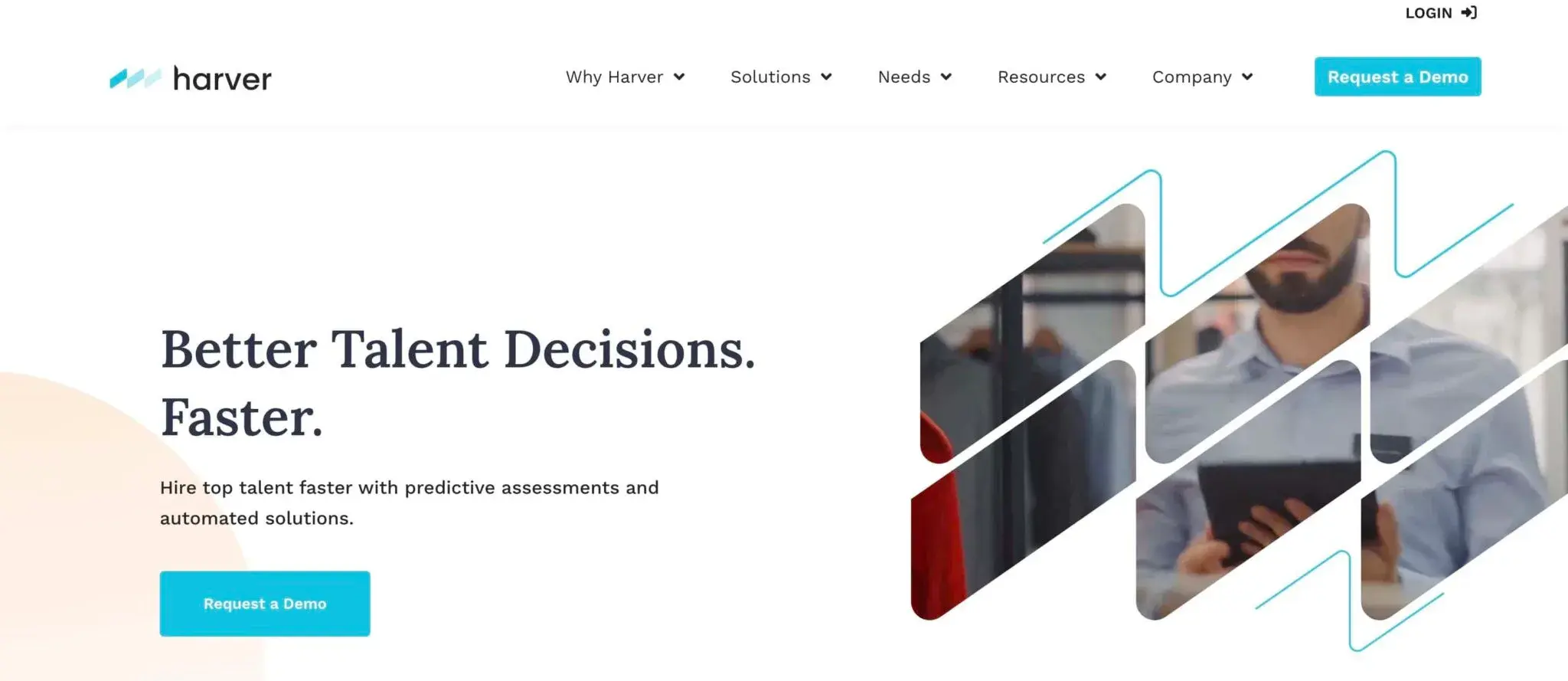
The platform assists businesses through talent assessment by providing analytical candidate predictions. Through assessment evaluations of candidate skills businesses achieve better candidate selection.
Pricing: Starts at 5K per year.
Key Features:
- Pre-employment assessments.
- In-depth behavioral and cognitive testing.
- ATS integration.
Pros:
- Provides detailed insights into candidate capabilities and fit.
- Adaptable to various job roles.
Con:
- Advanced features need setup time with training staff members.
10. Talmundo – Best for Onboarding
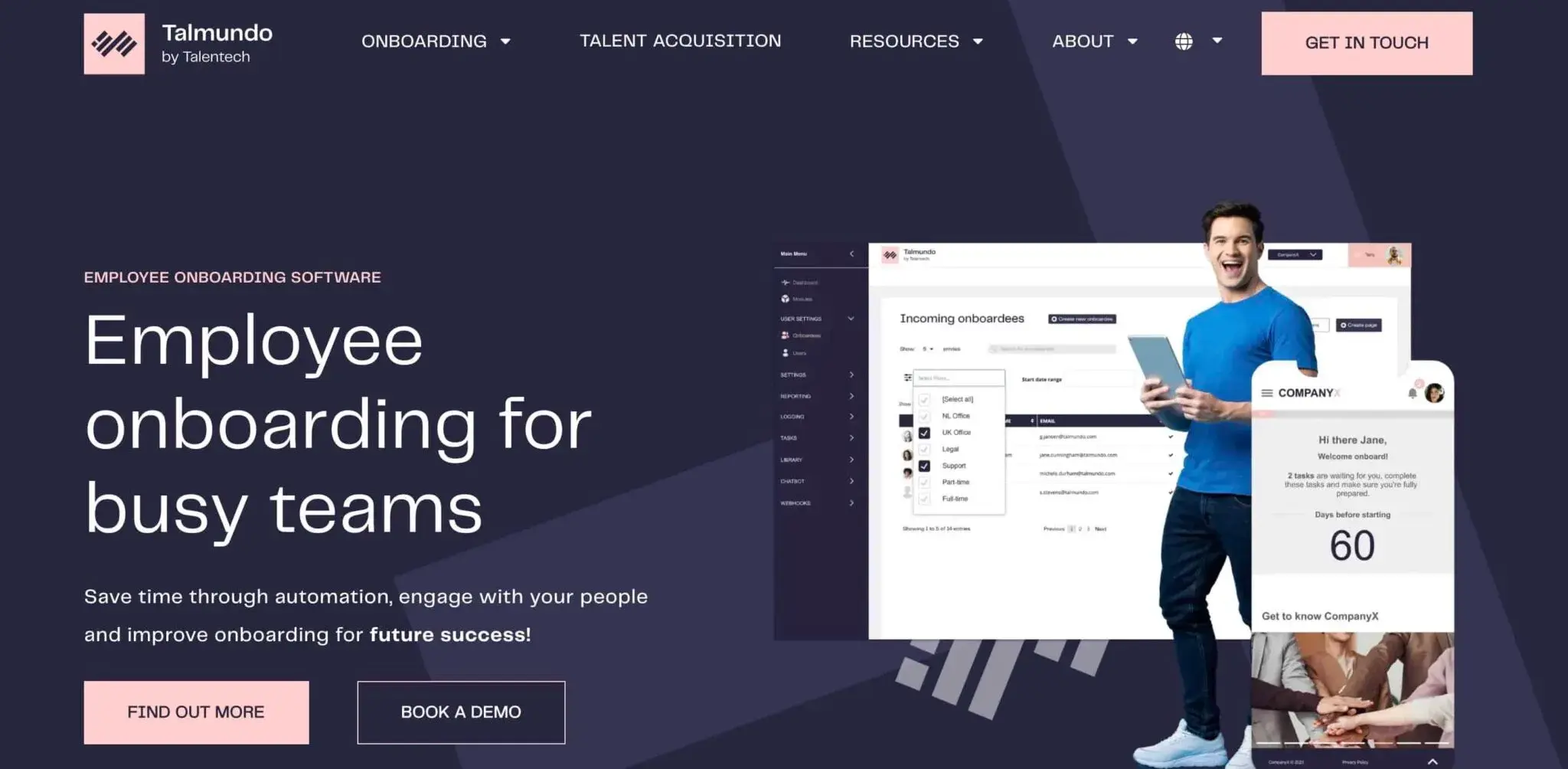
Talmundo delivers individualized onboarding through its platform.
Pricing: Starts at $5,5K per year.
Key Features:
- Custom-made onboarding.
- Automatic task delegation and automated handling for documents.
- Tracking for employee training and development.
- Integration with HRIS and other systems.
Pros:
- Intuitive interface.
- Cuts down on administrative tasks.
- The setup of advanced customization features might become a challenge.
Who Needs Recruiting Tools Most?
Companies depend on recruiting tools to develop better hiring while obtaining talented team members. That digital tools bring the most benefits to following groups:
- HR Teams need online recruitment tools to track applicants and improve evaluation.
- Recruiting agencies use platforms to enhance their candidate search capabilities as well as speed up hiring routine.
- Small and Medium Business (SMBs) having limited opportunities and tight funding turn to automation software to reduce hiring burdens, cut costs, and improve talent acquisition.
- Large Enterprises and Corporations need scalable solutions. Recruiting systems enable controlled workflows as well as analytics enhancement with joint operational functions among teams.
- High-Growth Startups need to find candidates quickly and precisely. Startups use recruiting technologies to welcome talented professionals even when running quickly.
- Industries with High Turnover – sectors like retail, healthcare, and hospitality experience frequent workforce fluctuations. Hiring tools enable swift, targeted recruiting to maintain operational stability.
Last Words
Recruiting tools play a significant role in modern hiring; they add efficiency, scalability, and even better decision-making in the recruitment process. Of those, 1-Way Interview is one of the simplest and most affordable platforms for one-way interviewing. Sign up for free today and experience candidate screening!
FAQ
What Are Benefits of Recruiting Tools?
They help reduce the hiring process through automation and are less costly and more efficient in producing quality candidates.
Why Do Companies Use Recruitment Tools?
Recruitment technology is used by companies to manage large volumes of applications, reduce manual interventions, and tap into useful hiring intelligence. It also improves candidate engagement on the ever-increasing social media platforms.
How Do Recruitment Technologies Reduce Bias in Hiring?
Employers need recruiting softwares for processing large volumes of applicants so they can sift through them easily and accomplish some previously laborious steps; they also need the technology for the information generated through it that enhances hiring. They also increase candidate engagement.
Are Tools for Recruiting Suitable for Small Businesses?
Yes, the concept of online tools is suitable for small businesses. Most of the platforms provide free-for-life plans and here key features to allow the entrants to compete with large organizations.
What Are the Challenges of Using Recruiting Software?
There are technical limitations, learning factors, and the need to make tools compatible with other technologies used.
Are Recruiting Tools Effective?
Yes, the tools that employers use during recruitment are useful in so far as they reduce the amount of time required in the process, aid in the evaluation of the candidate, and most importantly, improve the general hiring.
Can Recruitment Tools Improve the Candidate Experience?
Technology has enhanced the candidate experience by providing transparency, quick response rates, and record interaction. Recipients describe increased feelings of value and information during the entire period.